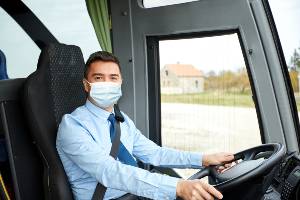New York Bus Accidents Lawyers
Finkelstein & Partners, LLP
1279 NY-300
Newburgh, NY, 12550
(845) 420-1779
Review Us On Google
Finkelstein & Partners, LLP – Winning Serious Injury Lawsuits Since 1959

Getting hit by a bus has almost become synonymous with a horrible experience. It is no wonder since the image of tens of thousands of pounds of metal and glass bearing down on you can construct such a sense of dread and helplessness. In New York, however, we know it is more than just an exaggerated metaphor. People rely on buses daily to get them from place to place. Accidents happen with so many people and buses on the streets. At Finkelstein & Partners, LLP, we have been fighting personal injury cases since 1959, from our humble beginning in Newburgh, NY. We have seen our share of bus accidents and know that beyond the idea of such a terrible event, there are many other frightening things to consider.
New York Bus Accident Guide
- Why Choose Us
- Compensation
- The Unique Dangers of Bus Accidents
- Fighting Insurance Companies
- What to Do After an Accident
- Contact Finkelstein & Partners, LLP
Why Choose Us
At Finkelstein & Partners, LLP, we take a unique approach to working with our clients to help ensure a successful relationship. Our clients put a lot of faith in us for a good reason. With over 85 attorneys, 170 paraprofessionals, and case managers, we are available to our clients, giving them the personal attention that other law firms lack. Our firm operates throughout New York and New Jersey, from Newark up the Hudson valley and even to Boston.
When dealing with bus accidents, many law firms might be intimidated by going up against city governments, which have a reputation for not owning up to their part of safe and reliable mass transit. Many bus accidents go unreported. People who have been injured take weak settlements because they fear fighting mega-insurance companies, much less local government. At Finkelstein & Partners, LLP, we believe in holding guilty parties accountable for their actions and are not afraid to fight for the compensation our clients deserve. So if you have been injured in a bus accident, contact us today for a free consultation.
Compensation
Finkelstein & Partners has fought tens of thousands of cases, getting compensation for people who have been injured and now face hardships due to no fault of their own. Many of our cases have won settlements, and the court awarded compensation reaching millions of dollars. Having an attorney fight your case generally means that you will get a higher settlement from an insurance company than their initial offer. Sometimes significantly higher.
Many factors affect compensation. You can bet that an insurance company will go through every shred of evidence they can find to start shaving dollars off any award they are willing to give. At some point, you might be wondering if it was your fault. No one asks to get injured in a bus accident, but an insurance company will try to place a lot of the blame on you. When you hire an attorney, evidence, investigation, and negotiation strategies are on your side.
Finkelstein & Partners, LLP has a long track record of fighting insurance companies, which only care about protecting their bottom line. A life-changing event such as getting hit by a bus is significant. Your trauma and your recovery are important to us. To an insurance company, they are just numbers on a ledger. We know it is impossible to put a price on your pain, but you should at least be able to fight for the compensation you deserve that does all it can to help you put your life back together.
The Unique Dangers of Bus Accidents
Buses can be compared to trucks when it comes to sheer size, weight, and damage done in an accident. The force of impact with a bus can produce a lot of damage, not only to other vehicles, but also pedestrians. Like trucks, at the center of every bus accident is a weak link—usually the driver. Whether it is the driver’s skill, experience, or even a state of impairment, human error factors into bus accidents significantly. Next would be equipment failure. Regular maintenance, functional safety lights and signals, and even brake or tire condition can all mean the difference between safe public transit and a rolling death machine. Here are some factors to consider when dealing with bus accidents.
Types of Accidents
 As with many motor vehicle accidents, bus accidents can be varied. From car vs. bus to bus vs. pedestrian are all serious. But buses carry a significant distinction that other vehicles do not. Buses are designed to operate as high-capacity motor vehicles, transporting large numbers of people in the cities and on highways. The results are often dramatic and horrific.
As with many motor vehicle accidents, bus accidents can be varied. From car vs. bus to bus vs. pedestrian are all serious. But buses carry a significant distinction that other vehicles do not. Buses are designed to operate as high-capacity motor vehicles, transporting large numbers of people in the cities and on highways. The results are often dramatic and horrific.
- Structure accidents: Since buses incorporate a lot of weight and travel within rural and urban areas, it is not uncommon for a bus to hit a structure, causing injury not only to the occupants of the bus but also to the people inside the structure. Buildings, tunnels, overpasses, and bridges are often the scene of terrible accidents.
- Bus versus pedestrian: Buses have poorer visibility and longer stopping distances due to their size and mass. Pedestrians often find themselves in harm’s way and always lose against a bus.
- Bus vs. car: Buses weave through heavy street traffic and often clip or connect with other vehicles sharing the road. All too often, the bus will continue on its way, with the driver of the other vehicle being left with damage and resulting injuries. Buses have been known to run over other cars on the road, causing significant damage.
- Bus vs. bicycle: Much like accidents involving pedestrians, bicycle accidents factor in the vulnerability of a quickly moving vehicle with almost no protection against impact. Bus drivers should know they need to share the road with bikes like other vehicles, but sometimes this does not happen, and the results are tragic.
- Bus vs. train: All too often, buses have been involved in accidents on railroad crossings. Whether it is the poor judgment of a bus driver, or simply the size of the bus resulting in being struck by a moving train, the results are always dire. As with many bus accidents, if you are an occupant, you trust the driver with your safety and getting to your destination. Accidents with trains are almost always serious, and you have been left at the mercy of someone who put you in that situation.
- Impaired drivers: Driving a bus can be a monotonous experience with a driver looking at long hours on the road, repeating the same route over several stops, or facing inclement weather such as snow, rain, and ice. Commercial bus driver’s licenses require standards of training and physical ability to operate these vehicles. Some drivers have used stimulants to stay alert for long hours, while others drive while intoxicated, putting everyone around them at risk when their reflexes and judgment are impaired. When drivers operate recklessly, they turn thousands of pounds of moving steel and glass into a weapon.
Types of Injuries
Like many traumatic motor vehicle accidents, buses are at the mercy of physics when it comes to accidents. One of the things buses lack, which other vehicles have, are protective equipment such as seat belts and airbags. Buses usually rely on their sheer size and mass to absorb the brunt of any impact.
Here are some common injuries and how they relate to accidents involving buses.
- Bruises and cuts: Buses have a lot of windows to allow passenger visibility, but in an impact, shattered glass can cause severe cuts and bleeding. The blunt force trauma of being thrown from your seat, into other passengers, and tossed around the inside of the bus can result in bruises. If you are struck by a bus, you also face the potential for life-threatening injuries.
- Internal bleeding: The contusions suffered during a bus accident, especially a collision or a rollover, can cause significant damage to internal organs. Ruptured spleens, perforated lungs, bruised kidneys, and liver damage can all result from the forces of such an impact. Again, being at the receiving end of a bus collision can transfer even more kinetic energy into your soft tissue and organs.
- Broken bones: It takes surprisingly little force to break bones, even large bones such as the femur or pelvis. A bus collision or rollover can easily produce enough force. Being hit by a bus, either as a pedestrian or in a vehicle, can shatter bones and even sever limbs entirely.
- Whiplash: Inside a bus, the sudden stop and change of direction can cause neck and spine damage. Outside a bus, such as being rear-ended by a bus, your neck and muscular/skeletal structure have very little resistance to an impact of this kind. Whiplash can result in paralysis, chronic pain, and permanent nerve damage.
- Traumatic Brain Injuries: In any severe vehicle accident, your brain is vulnerable to the kinetic force involved in a collision. The forces exuded in a bus crash can bruise the inside of your brain and even disrupt blood vessels and shear arteries. Traumatic Brain Injuries (TBIs) can cause permanent cognitive impairment, stroke, and even death.
- Burns: In bus collisions, fuel tanks can likely rupture, and the resulting spill can ignite and engulf you and your vehicle in flames. Burns can be disfiguring, become infected, and require skin grafts or tissue removal for treatment.
- Death: Any number of these types of injuries can result in death, leaving the deceased’s loved ones with new struggles. Not only have they lost someone dear to them, but they are left without a member of the household providing financial support to the family. As with permanent disability, death accounts for significant losses in future earnings and the quality of life of those left behind.
Fighting Insurance Companies
 Insurance companies usually try to lowball you in a settlement, offering only payouts to cover losses such as property damage or medical bills. As time progresses, medical bills will often surpass this amount, and nothing will be left to cover future medical bills, lost time at work, rehabilitation, pain management, or pain and suffering resulting from physical and mental trauma. Future earnings are lost due to permanent disability, and even long-term care needs to be considered.
Insurance companies usually try to lowball you in a settlement, offering only payouts to cover losses such as property damage or medical bills. As time progresses, medical bills will often surpass this amount, and nothing will be left to cover future medical bills, lost time at work, rehabilitation, pain management, or pain and suffering resulting from physical and mental trauma. Future earnings are lost due to permanent disability, and even long-term care needs to be considered.
Insurance companies will investigate the evidence collected from law enforcement. Based on formulas, actuarial tables, and other trade information, they will make an offer of settlement to you. It is often tough to get fair compensation when the insurer of the person who caused your damages is in control. They will try to keep their costs low and protect their assets.
Finkelstein & Partners, LLP takes all available information, from traffic cameras to witness statements and any information you can provide to build a case. We look at your medical expenses, other losses such as damage to your vehicle or personal property, and other factors such as how the accident has affected your livelihood, mental health, and long-term factors like future earnings and prolonged pain and suffering. We use all of these at the negotiation table, and if necessary, we can take this information to court.
What to Do After an Accident
After the initial trauma of the accident, you have likely been through the basics of what happens at the scene of an accident.
Here are some other steps to follow that might help.
- See a doctor: Even if you do not think your injuries are all that major, it is essential to have yourself examined by a doctor. Many conditions, such as internal bleeding, TBIs, and even shock, can be missed initially. All of these conditions are life-threatening if left untreated. Follow treatment plans and keep appointments to follow-up visits and rehabilitation/physical therapy.
- Document everything: As mentioned before, your attorney will want to provide evidence and review the facts in their investigation. Keep track of all receipts, medical bills, and repair/replacement expenses. Obtain copies of the police report, and keep a record of any newspaper clippings, news reports, or other information about the accident. Keep a journal of your progress as you continue healing in the aftermath of the accident.
- Call Finkelstein & Partners, LLP: Admit no fault in the accident and contact Finkelstein & Partners, LLP to discuss your case with an attorney. Admitting fault is a premature reaction to trauma. Due to the circumstances, it is probably not even an accurate assessment of what has happened. An attorney can work with you to protect your rights and get you the compensation you deserve for your injuries.
Contact Finkelstein & Partners, LLP

Finkelstein & Partners, LLP has been serving clients since 1959. We have covered a variety of personal injury cases, from minor injuries and damage to facing down city government, corporations, and insurance conglomerates. Our clients are important to us, and getting them the compensation they deserve to start their lives again after a tragic accident is our goal. Whether Newburgh, Syracuse, Buffalo, Albany, Kingston, or Rochester, we proudly represent clients in New York, New Jersey, and Boston.
Our reputation is respected nationwide, and we get results. If a New York bus accident injured you, please contact us at (518) 452-2813 and speak with our team. The consultation is free but worth much more than you can imagine. Knowledge is everything in the long battle ahead, and you do not want to go through this alone. A personal injury attorney can take much of the burden off your shoulders so you can focus on more important matters, such as healing and getting your life back on track.
